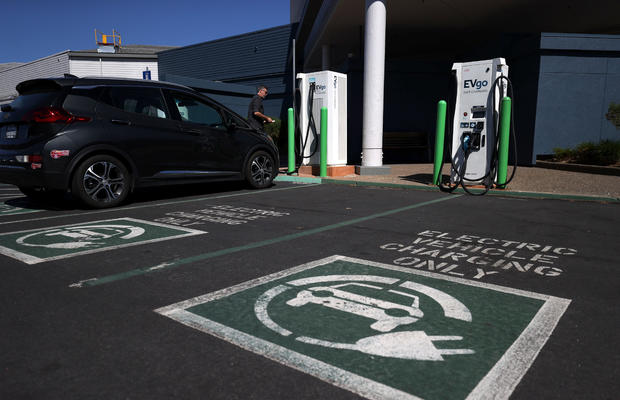Why is it so hard to find chargers for electric cars? Utility regulations are partly to blame.
The millions of drivers behind the wheel of an electric vehicle — an estimated 18.7 million by 2030, up from a mere 1 million in 2018 — could upend a staple of the American landscape and local economies: the gas station.
That's thanks to the confluence of existing regulations that affect the price of electricity, the way gas stations make money, where EV owners live and how they charge up.
Today, most EV owners charge their vehicles at home using slower Level 2 chargers. Those without that capability, or drivers headed a long distance who need to charge along the way, can head to a charging station with a faster commercial Level 3 charger — typically located in a shopping center or apartment parking lot and only sometimes at a gas station.
It's "nearly impossible" for fuel retailers in most states to profit off EV charging, because of regulations in place that keep businesses from selling electricity for more than it costs them, AJ Siccardi, president of Metroplex Energy, a subsidiary of RaceTrac Petroleum, told CBS News.
While gas stations purchase liquid gas wholesale from refineries — allowing customers to look for a better price on fuel from one block to the next — the price of electricity is set by public utilities according to demand on the electric grid at any given time.
Siccardi says the ability to choose suppliers keeps the fuel market competitive and prices lower for customers, especially in the long term, while state and locally regulated utilities offer customers electricity or water efficiently, but via only one source.
Siccardi says legislators and regulators don't need to spend a lot of time figuring out how to make the market competitive.
"All they need to do is follow what's worked in the past in places like the fueling business."
But charging infrastructure across the country has not followed the liquid fuel model — and neither has the way people pay for it.
Tesla, which makes three of the top five most popular EVs in the country, has installed more than 25,000 charging stations around the world for their customers only. Owning the car is the buy-in to use Tesla's chargers.
Other charging providers, such as ChargePoint and EVgo, offer customers subscriptions or pay-as-you-go models to "refuel."
Charging providers can offer EV drivers per-minute rates for the time they're parked charging up or per-mile rates that are often allotted in monthly subscriptions. This allows them to operate where it is otherwise illegal to resell kilowatt hours of electricity.
Gas stations have been slow to install EV charging because doing so is expensive and any margins are slim at best. That's why EV retailers have been stepping in, said Garrett Fitzgerald, the head of electrification at the Smart Electric Power Alliance, a nonprofit that works with electric utilities to implement and deploy clean energy resources.
"Historically, nobody's profited on these public charging networks. It's a very challenging business model in the early days and you're constantly having to grow your network because the EVs are growing and you need to be a little bit ahead of that so your customers see your products out there in the market," he said.
Utilities typically bill commercial customers both for pulling power from the grid as well as for the electricity used.
"So if you have one charge session in the month or 100, that component of a bill is the same. So if you have a charger that's not very well utilized, you can still be paying a pretty high electricity bill. And so until you get utilization up on your charges, profitability is pretty low" for gas stations and independent providers who participate in subscription programs, Fitzgerald said.
Fitzgerald believes replicating the gas station model doesn't suit the needs of an electric vehicle. He expects most drivers will charge their EVs parked at home or at work, as 85% currently do.
But since "it's relatively uncommon" for utilities to own charging infrastructure, drivers will still have to rely on a middleman who owns the space for a charging station, pays for the electricity from the utility and provides it to customers.
Some partnering has already begun. Earlier this year, Shell agreed to install EV charging across Texas for General Motors customers. Tesla has partnered with numerous companies, including convenience store and gas station chain WaWa, in building its Supercharger network.
Ultimately, Fitzgerald said, the federal government and states may have to spend money to expand EV charging if the country hopes to have a carbon-neutral power grid by 2050 that includes fuel retailers, charging providers and utilities.
And without that federal funding, experts warn certain communities might be left out of the EV boom. Today, sales are significantly lower in rural and low-income communities. Since it's hard for a business to make money with an EV charger, Fitzgerald worries retailers and developers in areas where few people drive EVs won't build them — and because there's nowhere to charge, people won't buy new EVs. That would leave those areas — historically, some of the most affected by the pollution cars and trucks spew — the most reliant on the gas-powered vehicles of yesteryear.




